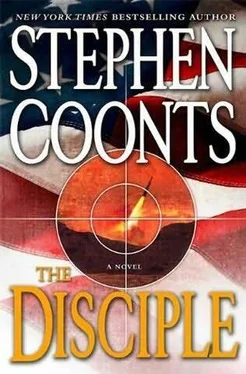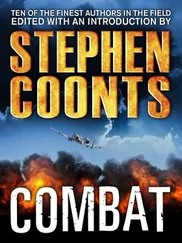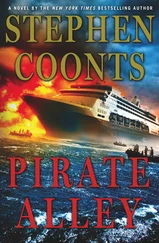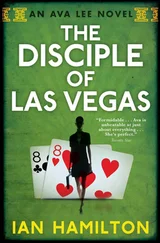Stephen Coonts - The Disciple
Здесь есть возможность читать онлайн «Stephen Coonts - The Disciple» весь текст электронной книги совершенно бесплатно (целиком полную версию без сокращений). В некоторых случаях можно слушать аудио, скачать через торрент в формате fb2 и присутствует краткое содержание. Жанр: Триллер, на английском языке. Описание произведения, (предисловие) а так же отзывы посетителей доступны на портале библиотеки ЛибКат.
- Название:The Disciple
- Автор:
- Жанр:
- Год:неизвестен
- ISBN:нет данных
- Рейтинг книги:4 / 5. Голосов: 1
-
Избранное:Добавить в избранное
- Отзывы:
-
Ваша оценка:
- 80
- 1
- 2
- 3
- 4
- 5
The Disciple: краткое содержание, описание и аннотация
Предлагаем к чтению аннотацию, описание, краткое содержание или предисловие (зависит от того, что написал сам автор книги «The Disciple»). Если вы не нашли необходимую информацию о книге — напишите в комментариях, мы постараемся отыскать её.
The Disciple — читать онлайн бесплатно полную книгу (весь текст) целиком
Ниже представлен текст книги, разбитый по страницам. Система сохранения места последней прочитанной страницы, позволяет с удобством читать онлайн бесплатно книгу «The Disciple», без необходимости каждый раз заново искать на чём Вы остановились. Поставьте закладку, и сможете в любой момент перейти на страницу, на которой закончили чтение.
Интервал:
Закладка:
Ilin examined the glowing tip of his cigarette. “You people are producing highly enriched uranium, and you promised you wouldn’t.”
“Iran must have a stable, modern source of electrical power.”
“Don’t give me that! We both know the mullahs want nuclear weapons and they’ve squandered billions on the facilities to make them.”
Sultani’s voice rose to a roar, and he came out of his chair. “Lies, all lies! You justify an attack on the nation of God with lies! We will not listen. Russia took our money, made promises, and we are left with useless hardware, defenseless against powerful enemies. You tell your Premier Putin that he cannot play us for fools. If he wants cooperation and respect, he will have to earn it. So far he has earned nothing but contempt. Tell him that.”
Sultani sat and mopped his face with one hand.
In the smoky silence that followed, Ilin said, “Obviously, the Israelis were using secret American electronic countermeasures technology to shield their planes from detection.”
“Americans invent, innovate, research… and Russians lie, cheat and steal. Your ambassador assured us that the S-300 system could detect and defeat the latest frontline American and Israeli fighters. We wouldn’t have bought it without that promise, and you and the ambassador and Vladimir Putin know it.” His voice began to rise. “We do not need any more long-winded technical explanations of how clever the Americans are or how they outwitted you Russian geniuses. Nor do we need any more worthless, obsolete equipment that doesn’t work-we already have hundreds of millions of dollars’ worth of that .” Sultani opened the top button of his shirt.
“General Sultani, if your reactors are used for peaceful power generation and you don’t enrich the spent fuel for fissile material,” Ilin said coolly, “as you promised us and the international community, you probably have nothing to worry about from the Americans and Israelis.”
“Don’t lecture me or try to dictate foreign policy to the Iranian government,” Sultani snarled. “We are surrounded on three sides by enemies of God. Keep your promises. Give us an antiaircraft defense system that works as you said it would.”
Janos Ilin was still as cool as he was when he walked into Sultani’s office. “The latest American CIA assessment, which they made public, said Iran does not have a nuclear weapons program. Is that true or false?”
Sultani’s eyes narrowed to slits.
Ilin stubbed out his cigarette in the ashtray and rose to go.
Habib Sultani stared at Ilin’s back as he walked out, followed by the escort, Ghasem.
CHAPTER THREE
There were two of them standing on the sidewalk ahead, two young men, watching me as I approached. We were in a working-class neighborhood-read slum-in Tehran, Iran. They stood there watching me, then glanced at each other.
I was out for my morning run, wearing shorts and a sweatshirt, and I stuck out like a sore thumb-clean-shaven, barbered, fair skin. Obviously I was a foreigner, European or American, and consequently rich. No doubt they thought I had something worth stealing. I did-my wallet, diplomatic passport, and cell phone.
I kept my eyes on them as I trotted toward them. I sized them up as working-class guys, rough clothes, unshaven, who thought they were tough. Well, all three of us would soon find out.
I glanced over my shoulder to see who was watching or following, just in case this might be a setup. No cars following, none parked nearby, no cops, three or four men in sight, all busy doing something else.
The distance closed rapidly; then I was there and they came at me, one from each side. I veered toward the one on the left, set my feet just so and kicked him in the crotch. Caught him solidly. He hadn’t expected that move and doubled over.
I spun around and went at the other one, who had started to come at me. Only then did I see the little knife he had in his right hand. My charge was unexpected. I grabbed his right wrist with both hands, half turned and threw a hip into him. Using his momentum, I pulled him into me and threw him, still holding on to that right wrist with both hands. The bones in his arm snapped with an audible crack. As he hit the sidewalk and the knife skittered away, I released his wrist. His lower arm was twisted and turned about sixty degrees from its proper angle.
I was tempted to tell him, “Bad break,” but stifled myself.
It was all over in less than eight seconds and I was trotting on. I glanced back. Both of them were writhing on the sidewalk, with a couple of bystanders staring at me.
Running in the megalopolis of Tehran was an adventure. Not so much the running, but crossing the streets.
Like most cities in the third world, Tehran had grown exponentially as the population exploded in the aftermath of World War II. The dearth of contraceptives meant large families, the medicine men used just enough modern medicine to keep more of the kids alive, and rural peasants moved to town looking for a job. Today Tehran and its sprawling suburbs contained somewhere between fifteen and twenty million people, about one-fifth of the Irani an population. The population explosion meant the Iranian economy needed to create eight hundred thousand new jobs a year, and that wasn’t happening.
The streets, avenues and boulevards, all built for one-fifth the amount of traffic they were carrying, were clogged. Gridlock was the proper description of morning and evening rush hour. Road rage was endemic. Many of the drivers and motorcyclists regarded a pedestrian, especially one moving quickly, as a sporting challenge. Crossing the street became an exercise in terror.
There was heavy air pollution, too, so bad it made Los Angeles’ smog seem like an unattainable dream. It seared the lungs, burned the eyes and limited visibility on windless days to no more than two miles.
Today, as usual, I managed to get back to the hotel in one piece, with more close calls in my logbook.
After a shower, I dressed and walked the three blocks to the Swiss embassy annex, a small building just down the street from the real Swiss embassy. Although America and Iran had not resumed diplomatic relations since the takeover of the American embassy in 1979, the United States had recently opened an American Interests Section in the Swiss embassy annex. Of course, my little corner was in the basement.
The room was small and divided by a waist-high temporary wall, the bottom of which was plywood nailed to two-by-fours and the top of which was latticework. The whole thing was painted a hideous brown. In the wall were two windows, one for me and one for my colleague, Frank Caldwell.
Here Frank and I took applications from Iranians asking for visas to visit America. We also were supposed to interview folks who wanted to permanently immigrate to the good ol’ U.S. of A., but since our government was worried that jihadists might slip through, they had declared a moratorium on immigration requests. Consequently we took only tourist visa applications, none of which the State Department would approve unless we were absolutely sure the tourist would indeed come flying home to this mud-hut Islamic paradise when his vacation was over.
I probably should pause to introduce myself. My name is Tommy Carmellini, and although I was stuck here in this basement four hours a day interviewing Iranians who desperately needed a vacation in the heart of the infidel empire, the United States, I didn’t work for the Department of State. Nope. I was a CIA operative. I was pretending to be a State visa guy while I tried to steal the deepest secrets of the mullahs. So far I hadn’t found any secrets to steal, deep or shallow. I had, however, met a lot of Iranians with fathers, brothers, cousins, uncles, nephews and children safely lodged in America whom they wanted to visit; see before they died, either the host or the visitor, and renew those precious family ties; then, you betcha, come on home.
Читать дальшеИнтервал:
Закладка:
Похожие книги на «The Disciple»
Представляем Вашему вниманию похожие книги на «The Disciple» списком для выбора. Мы отобрали схожую по названию и смыслу литературу в надежде предоставить читателям больше вариантов отыскать новые, интересные, ещё непрочитанные произведения.
Обсуждение, отзывы о книге «The Disciple» и просто собственные мнения читателей. Оставьте ваши комментарии, напишите, что Вы думаете о произведении, его смысле или главных героях. Укажите что конкретно понравилось, а что нет, и почему Вы так считаете.












